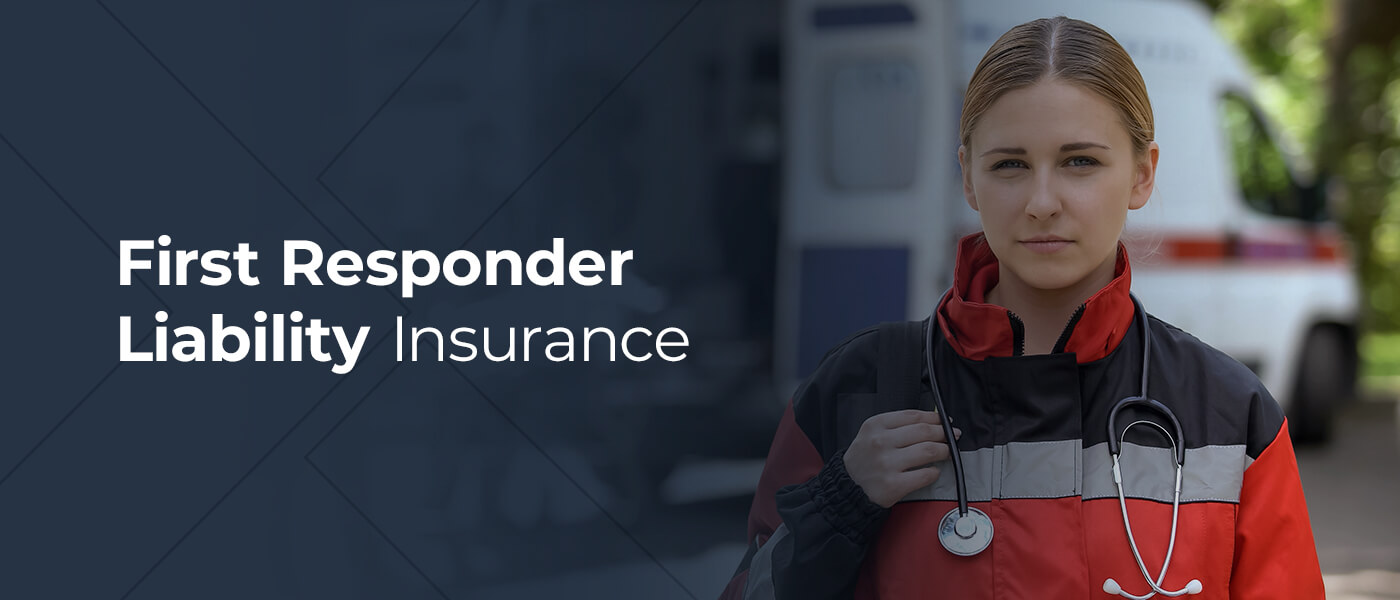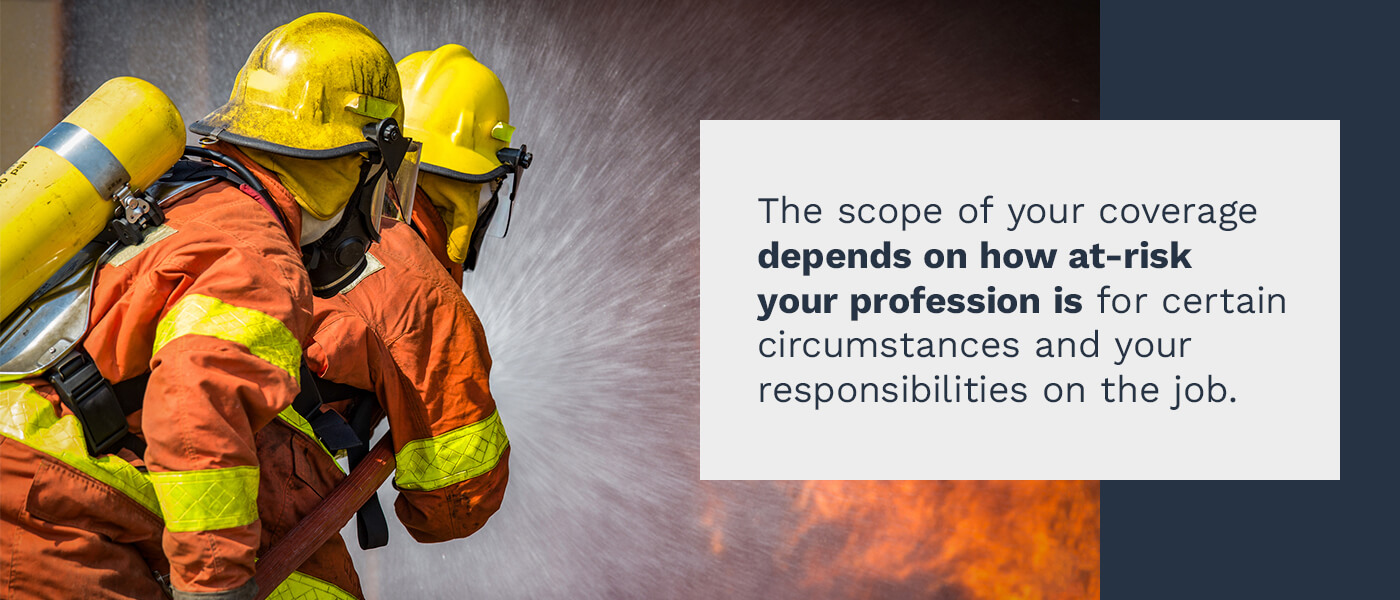
First Responder Liability Insurance for Off-Duty Firefighters, EMTs, and Other Emergency Personnel
For first responders, saving lives is part of the job description. Firefighters, EMTs, paramedics, emergency response teams, evacuation and rescue, and lifeguards all go to great lengths to make the lives of strangers safer, often putting their own lives at risk. You want to make sure you have the insurance coverage you need to protect you while you’re protecting others.
Custom first responder liability coverage insurance plans are available to fill gaps in your conventional insurance policy. Depending on your career, this could include general liability, wrongful acts, property damage, failed CPR, weapons coverage, on duty and off duty, personal liability protection, professional liability, and evacuation coverage. You can shape a custom first responder liability plan to suit your needs.
Why Buy On- or Off-Duty First Responder Insurance?
First responders have many responsibilities on the job. They often need to protect the lives of others and may be called in to help save people who are in dangerous situations. For example, a lifeguard might need to rush into the water to save someone who is having difficulty swimming. An EMT or paramedic might be called to the scene of an auto accident or shooting and need to provide critical care.
First responders also often find themselves in situations where they are potentially in danger. For example, firefighters have one of the highest rates of injury out of all occupations. They risk getting burned or trapped in buildings. They can also develop severe respiratory illness from smoke inhalation and other occupational hazards.
First responder insurance provides additional coverage beyond basic liability insurance protection and basic health insurance. Depending on the type of work a first responder does, the insurance policy can protect against lawsuits, accidental death, medical malpractice, and disability.
Insurance is essential, as it provides financial protection to people who serve critically important roles in society. If a firefighter or EMT is injured on the job, they deserve to have coverage that can support them financially. If they are found liable for injury or damage, they need insurance to protect them from any lawsuits.
What Will My Liability Insurance Cover?
First responder liability insurance can cover a variety of situations. The scope of your coverage depends on how at-risk your profession is for certain circumstances and your responsibilities on the job. Your coverage can also differ if you’re purchasing an individual policy or a commercial one. Some of the things that first responder liability insurance can cover include:
- General liability: General liability coverage protects against personal injury and property damage claims that can happen while working.
- Professional liability: Professional liability coverage can offer protection if someone sues you because they believe they were injured or property was damaged because you didn’t do your job correctly. For example, if an EMT doesn’t drive a patient to the hospital quickly enough or if a lifeguard isn’t paying attention when someone starts drowning, professional liability coverage can kick in.
- Medical malpractice: Some first responders might need medical malpractice coverage if they provide medical care to patients.
- Concealed carry: If a first responder carries a firearm, concealed carry coverage could be part of their first responder liability package.
- Auto: EMTs and firefighters often have to drive commercial vehicles during the course of their work. An insurance policy should include commercial auto coverage if that’s the case.
- Income: If a first responder can’t work, their insurance policy can cover lost income until they can go back to the job.
Is Liability Different Depending on My Job?
Your exact risks and insurance needs will differ depending on the type of first responder work you do. Take a look at some of the coverage needs for different types of first responders:
EMT Liability Insurance
Paramedics and EMTs often work for ambulance companies or hospitals. They are the people who arrive on the scene following an accident or emergency. Although part of their job is to transport patients to hospitals for full medical treatment, they also often provide treatment at the scene.
If an EMT makes a mistake in treating a patient, they can be found liable, and they might be sued. Medical malpractice insurance should be part of their liability coverage to minimize the financial harm that could result from making a mistake.
Since EMTs often need to drive ambulances as part of their job, auto coverage should also be part of their insurance package. Depending on their employment situation and who owns the ambulance, the coverage might be part of their employer’s policy or a policy the EMT or paramedic has in their name.
Firefighter Liability Insurance
Whether they are volunteers or paid, firefighters need liability coverage to protect them in case a person sues for damage to their property or in case of an accident involving a fire truck. A person might sue a firefighter or fire company if they believe the individual or company was negligent when putting out a fire. For example, the spray used to tamp down a fire might damage another building area that wasn’t on fire.
Since fighting fires can cause injury or illness, many firefighters also benefit from insurance coverage that protects them, such as medical coverage for accidents that occur on the job or accidental death and dismemberment coverage.
Lifeguard Liability Insurance
Whether at the pool or the beach, lifeguards play an important role in keeping swimmers safe and responding quickly to accidents and emergencies. As they are trained professionals, lifeguards can be found responsible if someone is injured when they are on duty. Lifeguard liability insurance can provide coverage if a lifeguard is found to be negligent or makes a mistake on the job that leads to injury or death.
What Could Happen If I Don’t Get First Responder Insurance?
First responder insurance protects you if something happens on the job that you could be liable for. For example, say you’re a lifeguard hired to guard the pool during a party. You’re chatting with a guest while on duty, and someone starts flailing their arms in the deep end of the pool. You don’t notice right away because you are focusing on the other guest. By the time you get to the person, they’ve drowned.
The family of the drowned person could sue you for negligence. If you don’t have insurance to cover you, you’ll have to pay your court costs and attorney’s fees out of pocket, plus the cost of the settlement or damages. If you purchase the right level of insurance coverage, it will most likely pay for most or all of your costs.
When Should I Get My First Responder Insurance?
Ideally, you should purchase an insurance policy to protect you before you begin working as a first responder. You can check with your employer to see what sort of coverage they offer and how their policies protect you. Then, you can buy coverage that fills in any gaps in the coverage from your employer.
If you’re self-employed, such as a lifeguard who works on a contract basis, you’ll want to get insurance before you take on clients. Having liability insurance can make you more attractive to potential clients as it can take some of the burdens of liability off their shoulders.
Contact XINSURANCE for Your First Responder Insurance Needs
XINSURANCE provides customized insurance solutions that can protect you where typical business and homeowners policies don’t. With our all-in-one approach, you can customize your coverage, deductibles, policy limits, and premiums to create a policy that is just right
Updated May 19, 2021

Rick J. Lindsey hails from Salt Lake City, Utah. He began working in the mailroom of his father’s Salt Lake City insurance firm, getting his introduction to the business that became his lifelong career. Rick J. Lindsey quickly rose through the ranks while working in nearly every imaginable insurance industry job. As an entrepreneur, specialty lines underwriter, claims specialist, risk manager, and a licensed surplus lines broker, Rick J. Lindsey is highly skilled in all levels of leadership and execution. As he progressed on his career path, Rick J. Lindsey discovered an urgent need for insurers willing to write policies for high-risk individuals and businesses. He was frequently frustrated that he could not provide the liability protection these entities desperately needed to safeguard their assets. He also formed the belief that insurance companies acted too quickly to settle frivolous claims. Rick J. Lindsey decided to try a different approach. He started an insurance company and became the newly formed entity’s CEO. This opportunity has enabled Rick J. Lindsey to fill a void in the market and provide a valuable service to businesses, individuals, and insurance agents who write high-risk business. XINSURANCE also specializes in helping individuals and businesses who live a lifestyle or participate in activities that make them difficult for traditional carriers to insure. If you’ve been denied, non-renewed, or canceled coverage, don’t give up quite yet. Chances are XINSURANCE can help.



